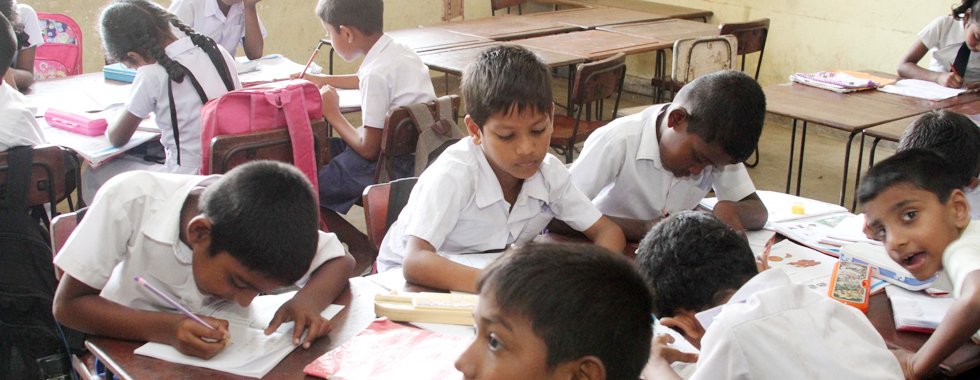News
Ministry rings the bell for absent schoolchildren
View(s):Poverty, drugs and parental
negligence keep thousands of
children from school but a new
project aims to break this cycle of
failure. Aanya Wipulasena reports
With her hair plaited neatly into pigtails and dressed in a well-pressed uniform washed with laundry blue, six-year-old Vidya* is about to return home from school. She says a loud prayer with her classmates and makes a silent wish before preparing to call it a day.
This was only her second day at school. Up to now, she has spent her days at home with her mother and younger siblings.

Assistant Director of Non-Formal Education in the Western Province, Mahinda Kodithuwakku
“I met my friend from the house next door at school. I’m very happy here. I like what they teach me,” she said, looking shyly at her class teacher.
Vidya is one of three students enrolled on Monday, World Children’s Day, at Ave Maria College in Mattakkuliya through a project to send non-schoolgoing children to school.
Ministry statistics show that 1.5 per cent – 50,000 of the children – between the ages of five to 16 do not attend school. The aim of the anti-truancy project is to place all these children in schools byDecember 31.
“We will be working with the police, Administrative Service officials, Economic Development officers, midwives, grama niladaris and other government workers to accelerate our project,” said the Director of Non-Formal Education and Special Education of the Education Ministry, H. P. N. Lakshman.
He said most of the targeted children were from estates in the Uva Province, particularly in the Nuwara Eliya and Badulla districts. His officials will be working with the Ministry of Plantation Industries to find these children and admit them to schools nearest their homes.
The project gives an opportunity for children who are eager, like little Vidya, to study in state-run schools and qualify in areas in which they show talent.
“My Vidya likes to study. Even at home she is sharp-witted. I knew she was special but we could not send her to school,” said her father, 49-year-old Rameshwaran* from Mattakkuliya who came to pick up Vidya after school.
With four other children to support, he earns a living by selling betel leaves – a competitive business. Sometimes he has to travel as far as Badulla – 220km away – in search of festivals to sell his betel leaves and saaravita..

Eager to learn: A project to send non-schoolgoing children to school has opened new horizons for them. Pix by Indika Handuwala
“I will send my child to school as long as I live,” Rameshwaran said. “Education is the best thing we can give our children. My child will be in a good position when she grows up,” he said in hope.
In third grade of the same school and engrossed in working out a sum is nine-year-old Amith*. This is his second day at school too. He is the fourth child in his family and his father, the breadwinner, works at a tea factory.
Amith said he always wanted to go to school and is happy that he has many friends here who help him. Before joining the to school he studied in an institution run by an NGO.
“What I learn in school is different from my life at home,” he said. “I add numbers, learn about the environment and learn to write Sinhala. Sometimes what is taught is hard for me but I try to catch up.
“Everything here excites me. When I was at home and watched my friends going off to school in their white uniforms I was sad – I wanted to go to school too.”
During the interval, Amith shared with his friends a packet of boiled manioc bought from the school canteen for Rs. 25.
The real heroes here are the teachers who have taken the responsibility to teach these children. As most students have no background education, teachers have to work from scratch to help them improve.
Amith’s teacher, Dilhani Dharmapala, has been teaching for nearly four years. She said Amith’s education is not up to the standard of other students but is positive that with hard work she can help him to improve.
Not all the children who were enrolled in schools are eager to stay. Eleven-year-old Kaveesha*, who was admitted to grade four, has not turned up.
Her teacher, V.D.T. Perera, believes she kept away because she was much older than the rest of the class; she lacked the education to go to a higher class. Ms. Perera, who has taught at the school for nearly 23 years, said Kaveesha was taller and more mature than her classmates and found it difficult to mingle with them.
When the Sunday Times visited Kaveesha’s home she was busy cleaning the house and looking after her six-year-old brother who was also not enrolled at school. Her mother and two elder sisters were at work in a tea factory from where they return around 9pm. Her father, who has a fish stall at the town junction, said he would send the child back to school next week.
“We are very poor people but we are trying to improve our living conditions. I want my children to have a decent education. I’ll send Kaveesha to school,” he said.
Assistant Director of Non-Formal Education in the Western Province, Mahinda Kodithuwakku, said that this year nearly 450 non-schooling students were put into schools. Most of them came from North Colombo where the living standards of families were low.
Mr. Kodithuwakku explained that a new amendment to the Education Act made school education compulsory for children aged between five and 16 years.
“There are children who do not even have birth certificates but the Education Ministry has taken steps to make Age Estimation Certificates that would allow them to obtain birth certificates,” he said.
The main problems his officials faced, however, was the ignorance of parents and the way they perceived school education. Mr. Kodithuwakku said most parents from poverty-stricken families sent their children to work because they were focused on getting an additional income to support the family.
“We try hard to hold meetings and educate parents,” he said. “Until their mindset changes nothing else will change.”
*(Names have been changed to protect identities)
| Drugs and poverty conspire to doom these children
Poverty, drug addiction and poor nutrition during pregnancy underlie truancy patterns in the Western Province, officials working with non-schooling children have found. “There is widespread drug addiction and trafficking of drugs in areas such as Mattakkuliya,” said Mrs. L. Manathunga, a Non-Formal Education Project Officer for the Western Province. “Sometimes one or both parents go to jail for possession of drugs. When this happens there is no one to look after the children. They idle or help their grandparents to look after their brothers and sisters.”  Ms N. Samarawikrema Due to poverty, some parents worked at three to four jobs daily, leaving their children unattended for long periods. Mrs. Manathunga said women who take drugs or do not have enough vitamins in their diet when they are pregnant, often gave birth to children with poor mental development who later found it difficult to keep up with the regular school curriculum. Many children in North Colombo have dropped out. Some get an informal education in schools run by NGOswhere they do not sit for examinations nor follow the syllabus stipulated by the government. “We try our best to teach parents that the education they get from these institutions isn’t recognised as a qualification that would enable them to get a job,” Mrs. Manathunga said. “But since they are provided with food, clothes and medicine the parents send their children to these places it is hard for us to break this system. Even today many children attend these schools.” The Principal of Ave Maria in Mattakkuliya, which has more than 700 students, Ms N. Samarawikrema, said school officials fight day and night to keep drugs away from the school. A drug known as “dhun kudu” is used by male students. “There are parents whose children come to learn here who sell drugs to other students. Because of this we had to hire a daytime guard to keep the children inside,” she said. “Other students, however, are friendly and help students who are enrolled halfway through the term. They even share their meals with children who are hungry because they are poor.” Ms. Samarawickrema said that when the staff tried to organise parent-teacher meetings not all parents turned up, saying that if they missed work they would not have food to feed their children. “More than 75 per cent of children in our school have one or both parents abroad, parents who have eloped with lovers or are in prison. This is the environment in which they learn,” she said. |

